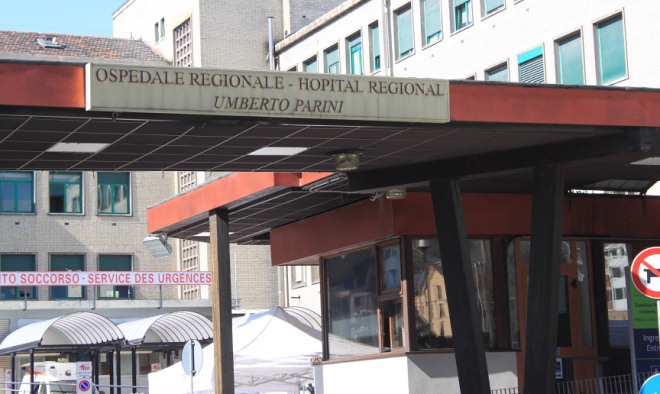“In Valle d’Aosta we have witnessed the dismantling of regional healthcare, especially hospital”
If the Aosta Valley seems to have emerged from the third wave of infections from Covid-19, the situation is not as rosy for the Aosta Valley healthcare in general. This was stated in a note by various medical trade unions (Anaao-Assomed, Aaroi-Emac, Anpo, Cimo, Fesmed, Fp-Cgil Medici, Fp-Cisl Medici, Fvm, Snr Fassid and Uil – Fpl Medici).
The Aosta Valley health situation is “complex and critical”, they warn. “Years of reckless health policies, made up of cuts and sacrifices, carried out both at a regional and national level, have led to the weakening of our public health. In particular, in Valle d’Aosta, from 2012 until almost the end of 2020, there was the dismantling of regional healthcare, especially hospitals, by regional governments which, culpably, have legislated for the reduction of beds and departments, have hesitated in the construction of a new hospital and influenced “afinalistic” choices and decisions by the company management ».
The unions also intervene on the transfer of the general manager of the USL Angelo Michele Pescarmona from Aosta to Turin. «The departure, for some improvised and for others release, of the general manager confirmed only a few months ago does not require additional comments. It is clear – the note reads – that what has been built in recent years by the regional government majorities and by the strategic directions has favored and continues to favor the loss of attractiveness ».
The unions also denounce a “gradual process of transformation from a ‘Hub’ hospital to a ‘provincial’ hospital to be dedicated only to emergencies (not all) and to outpatient services”. They explain: “some basic hospital services (orthopedics, radiology and, for a few weeks, also the emergency room) have long been guaranteed, for now in part, by” token “doctors appointed by cooperatives who, as is well known, do not give or can give continuity assistance to the citizens of Valle d’Aosta. If there will be fewer and fewer employed doctors who remain to work permanently 24 hours a day and 365 days a year – and who perhaps also live with their families in the Valley – it will be inevitable to entrust the management of most if not all of the hospital to cooperatives. “.
“The regional health system, as it is, is no longer in a position to withstand the shock wave deriving from all the criticalities, predictable and not, which have occurred in the last decade”, the unions continue, addressing the regional council. “For regional policy – they say – it is no longer the time to be or to appear deaf and blind in the face of the evident critical and default situation in hospital health care”. The regional government “must act, it must invest, it must plan, it must demand concrete actions from the company management, it must ask for the support of the trade unions and health professionals (those few who are left). The ability to guarantee the quality and effectiveness of health services and treatments is valid for the right to health of the Valle d’Aosta and tourists ”.
«Hiding behind a rebound of responsibility is now obviously useless – the statement continues -. Politics has before it an unrepeatable opportunity due to the gravity of the moment and is facing a crossroads with no possibility of taking a third path: making concrete, massive and immediate investments to guarantee a quality of life and remuneration in keeping with the current laws of market, so that the services are carried out all and well, the waiting lists are demolished, and hospital doctors are not pushed into the “generous” arms of private healthcare or public hospitals outside the region. In fact, investments for infrastructures alone (already allocated but not used) are not enough because the risk of finding oneself with a newly built hospital but unproductive because it is empty, without doctors and health managers, is decidedly high ».
Elena Giovinazzo
.

